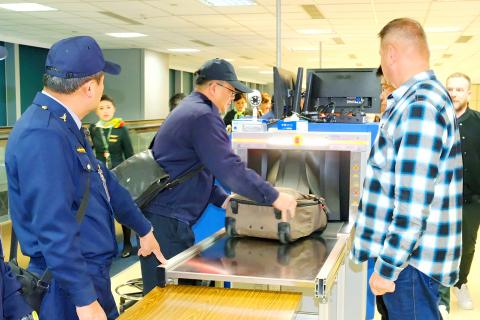Two Chinese pork jerky products seized at customs have tested positive for African swine fever, the Council of Agriculture said yesterday.
Tests found the two products collected from the quarantine amnesty bins at Taipei International Airport (Songshan airport) on Jan. 23 and 24 — one from Jiangsu Province and the other without a label indicating origin — had strains of the virus identical to those found in China, the council said.
The results brought the number of confiscated pork products testing positive for the disease to 20, council data showed.

Photo: CNA
Two more Chinese visitors on Saturday were denied entry into the country after failing to pay a NT$200,000 (US$6,505) fine for the illegal import of pork products, bringing the total of barred visitors since the regulation took effect on Jan. 25 to six, all Chinese, council data showed.
The council reiterated that it hoped Beijing authorities would provide more information about the disease, after the Rural Development Foundation on Saturday received a response from China’s Association for Agricultural Exchange Across the Taiwan Strait.
The foundation has since 2004 served as an information channel with the association, which is governed by Chinese Ministry of Agriculture and Rural Affairs.
It first wrote to the Chinese association on Dec. 20 last year to request information about the African swine fever outbreak in China, but the latter replied on Jan. 15 that the outbreaks were “sporadic” and called on Taiwanese to stop spreading false information, according to copies of the letters shown on the foundation’s Web site.
It wrote to the association again on Jan. 25 and received a reply on Saturday.
The disease has spread to 25 Chinese provinces, municipalities and regions, with 950,000 pigs having been culled, but blocks over infection areas in 23 provinces have been lifted, showing China’s quarantine measures were effective and that the outbreaks have abated, the association said.
While it was a sign of progress that the Chinese side finally replied, the information was of no avail as the same data is available from the World Organization for Animal Health (OIE), the council said on Saturday, adding that it expected Chinese authorities to provide “complete” information about the outbreaks.
The council last year said it wanted to send a delegation of academics and technical experts to China to collect information on the outbreaks, but has yet to receive a response from the other side, council Chief Secretary Chang Chih-sheng (張致盛) said yesterday.

Taiwanese can file complaints with the Tourism Administration to report travel agencies if their activities caused termination of a person’s citizenship, Mainland Affairs Council Minister Chiu Chui-cheng (邱垂正) said yesterday, after a podcaster highlighted a case in which a person’s citizenship was canceled for receiving a single-use Chinese passport to enter Russia. The council is aware of incidents in which people who signed up through Chinese travel agencies for tours of Russia were told they could obtain Russian visas and fast-track border clearance, Chiu told reporters on the sidelines of an event in Taipei. However, the travel agencies actually applied

Japanese footwear brand Onitsuka Tiger today issued a public apology and said it has suspended an employee amid allegations that the staff member discriminated against a Vietnamese customer at its Taipei 101 store. Posting on the social media platform Threads yesterday, a user said that an employee at the store said that “those shoes are very expensive” when her friend, who is a migrant worker from Vietnam, asked for assistance. The employee then ignored her until she asked again, to which she replied: "We don't have a size 37." The post had amassed nearly 26,000 likes and 916 comments as of this

New measures aimed at making Taiwan more attractive to foreign professionals came into effect this month, the National Development Council said yesterday. Among the changes, international students at Taiwanese universities would be able to work in Taiwan without a work permit in the two years after they graduate, explainer materials provided by the council said. In addition, foreign nationals who graduated from one of the world’s top 200 universities within the past five years can also apply for a two-year open work permit. Previously, those graduates would have needed to apply for a work permit using point-based criteria or have a Taiwanese company

The Shilin District Prosecutors’ Office yesterday indicted two Taiwanese and issued a wanted notice for Pete Liu (劉作虎), founder of Shenzhen-based smartphone manufacturer OnePlus Technology Co (萬普拉斯科技), for allegedly contravening the Act Governing Relations Between the People of the Taiwan Area and the Mainland Area (臺灣地區與大陸地區人民關係條例) by poaching 70 engineers in Taiwan. Liu allegedly traveled to Taiwan at the end of 2014 and met with a Taiwanese man surnamed Lin (林) to discuss establishing a mobile software research and development (R&D) team in Taiwan, prosecutors said. Without approval from the government, Lin, following Liu’s instructions, recruited more than 70 software